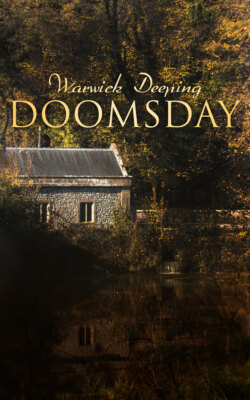Читать книгу Doomsday - Warwick Deeping - Страница 15
На сайте Литреса книга снята с продажи.
3
ОглавлениеHe did not recognize her at once, for she was in the shadow, and the light from the fire was wayward.
"Yes—what is it?"
He saw the white jug held to her bosom.
"Milk?"
She spoke quickly, as though a little out of breath.
"I'm so sorry to trouble you at this hour. My people are ill. The doctor ordered milk."
"Miss Viner—"
He stood back a little, and was silent for a moment, as though he was in doubt about something, or was embarrassed by her coming, and she noticed his hesitation. She did not expect hesitation in him; deliberation—perhaps.
"I'm sorry. Nothing very serious—I hope?"
"Bronchitis."
"Both?"
"Yes."
"Rather hard luck on you. The jug—"
She gave him the jug, wondering whether he was going to leave her standing on the doorstep, and if so—why? She could see Bobbo's fluffy head pressed against one of Furze's legs; even the dog seemed to deliberate.
"Won't you come in a moment? By the fire—while I go to the dairy. I'm afraid I'm rather a backwoodsman."
Now that he had asked her in she hung back.
"O, no—I mustn't bother you; I'll wait here."
"Please come in. I won't keep you a moment."
There was that in his voice which said "You shall come in," and she obeyed it, and to mask the surrender she spoke to the dog, caressing the fluffy head, and drawing it against her knee.
"What a dear! Your farm dog—?"
"Yes."
She would not show him her face, but while she bent over Bobbo she was all eyes and ears, and trembling with a quick and darting curiosity. She saw him move to the right, and put his hand behind him, and close a door that appeared to open into another room. Now, why did he do that? She supposed that the piano was in that other room.
And suddenly she felt herself stiffen. She was assailed by a consciousness of herself as an intruder, trespassing upon something that he wished to hide. But what could he wish to hide? A piano and a room which seemed to have had no light in it? She stiffened more awkwardly as her thoughts extended.
"Won't you sit down?"
He had pushed the one chair forward and she seated herself as though she were made of china, while he—with a queer look at her, went out by another door, carrying her jug. She heard the scraping of a match. And sitting very still, she turned a head on a rigid neck, and scanned this room of his and its poverty and disorder, its improvised tables, its pile of logs in a corner, its camp bed. Surely, he did not live in this room? No, that could not be. The work-bench with its litter of tools and leather and odd pieces of harness convinced her that he used this room to work in. And in her innocence she supposed that the dog slept upon the camp bed.
She heard Furze returning, and directly he reappeared she stood up.
"Thank you so much."
She held out her hands for the jug, smiling uneasily, her eyes downcast and hidden by their smoking lashes. She was in a kind of panic mood, and when she got herself to the door she realized that he was behind her.
"Good night, Mr. Furze."
"I'm coming out," he said; "take care of the steps. Wait while I light a lantern."
She spilt some of the milk on the doorstep while she was quaking there, wanting to run, but holding herself back from such foolishness. He was lighting his lantern bending over it as it stood on the table.
"I'll light you down the lane."
"O, please," she said; "don't bother; there is a moon."
"I have to come out, anyway," was his reply.
He came and held the lantern shoulder high so that she could see the steps, and when she was down them he moved quickly in front of her to light her along the path.
"Just follow."
She followed, and when they reached the gate he held it open for her.
"Please," she said, "I can manage now."
He closed the gate deliberately.
"Oh, I shall be up most of the night. It so happens, if you call it wasting my time—"
She walked on—and he was beside her.
"Up most of the night?"
"Yes—lambs."
But she was still asking herself why he had closed the door of that other room just as though he had something or someone to hide. And yet—if he was to be up half the night—? And—anyway—did it matter? She saw the Six Firs towering overhead, and feeling that her silence had been rather churlish she turned her face to him as they reached the road.
"You must not come any farther. Good night."
"Good night. I hope your people will soon be better. We shall both be looking after helpless creatures—you and I."
His voice held her there for a moment, very still, and looking up at him.
"I think I heard you playing—"
"O, my poor old piano—yes. Schubert. Good for these winter evenings. And then I heard your knock."
She was holding the white jug to her breast, and to him her eyes appeared dark and immense.
"You must go to your lambs, Mr. Furze. Good night."
He stood and watched her go down the road.
